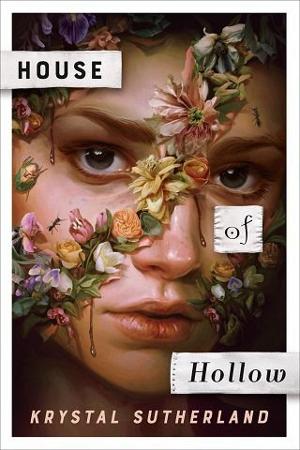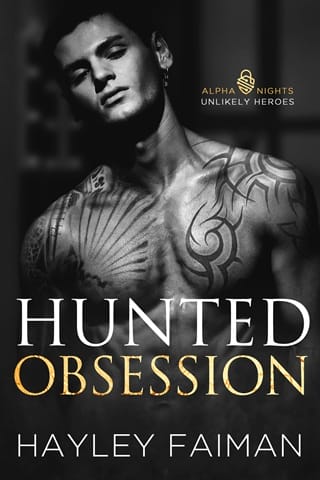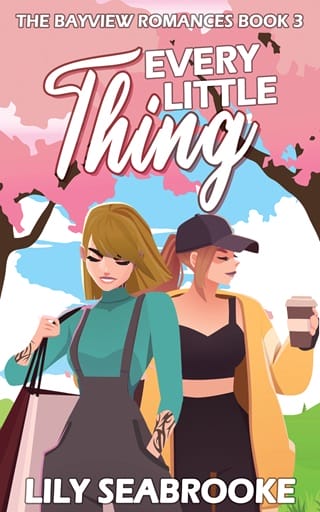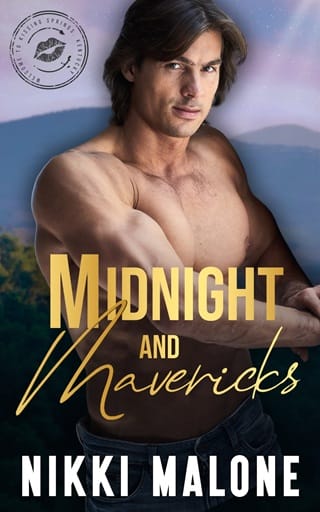Chapter 9
9
The man inthe skull was standing at the end of the hall, staring at me. He’d come back for something—maybe to make sure the fire had taken, or to retrieve something he’d forgotten. He hadn’t been expecting to see me, and I hadn’t been expecting to see him, so both of us stood in shock, unmoving. For a sharp, strange second, it appeared that the creature was afraid of me. Then he was fumbling with something at the back of his waistband. I caught a glint of metal.
“Shit, he’s got a gun,” I said, diving into the room as the first shot rang out. The bullet shattered the mirror behind me and sent a shower of glass into my hair. Vivi slammed the door closed behind me and locked it, but that only bought us a second or two. Bullets ripped through the wood, splintering it into toothpicks.
Vivi yelped and doubled over. My world contracted to the size of a pinhead.
No.
No.
Not Vivi too. I couldn’t lose both of them.
But she sat up when the shots stopped, her right hand pressed to her left arm. A red stain was spreading beneath her fingers. “Jesus, he shot me. You shot me, you psycho!” she screamed at the door. There was silence for a moment, then the door began to groan as the man leaned his weight against it. The wood swelled inward, fabric stretched across a fat gut.
“Get it, get it,” I said as I collected a handful of singed treasures from Grey’s bed and threw them out the window onto the wet street one floor below. Vivi followed suit, using her free hand to pick up a journal, some photographs, her backpack. We both scrabbled out of the window backward as the doorframe popped with a relieved sigh and the man tumbled toward us. I lowered myself down until I was hanging. Vivi, unable to grip with an injured arm and a hand wet with blood, fell and landed in a sprawl below me. Grey’s flat was only on the second floor, but the ground still felt far away. I let go and landed hard on my feet, an impact wave rolling up my spine, forcing the air from my lungs and making all my bones feel crumpled. We gathered up what we could of Grey’s things and ran. The man in the skull watched us from the window, our arms full of a few of the sodden, bloody trophies he’d tried to burn.
We ran for half a mile, leaflets of paper and drops of blood trailing behind us as we weaved through the backstreets of Shoreditch, past murals and trendy restaurants, sure he was right behind us. Two fire engines screamed past us in the direction we’d come from. We slowed to watch them. A thin column of smoke was rising in the distance now. We stood, breathing hard, and found each other’s free hand, knowing that the man had set our sister’s life on fire and all that was left of it now was what we held in our arms. Wherever Grey was, whatever had happened to her . . . we’d have to figure it out using only what we’d managed to salvage.
“Are you okay?” I asked Vivi breathlessly. My fingers were tacky with her drying blood. The left sleeve of her jacket was soaked through. She eased out of it, using the other sleeve to wipe away the slop of red. The bullet had only grazed her arm. There was a lot of blood, and it would leave a scar through her wisteria tattoo as wide and long as a finger, but it wasn’t deep. Vivi dug in her backpack for a scarf and started tying it over the wound to stymie the bleeding.
A passerby, an older woman in fur coat, slowed and stared at us. “My cat is vicious,” Vivi said with a shrug, totally deadpan. The woman hurried away.
“I got shot,” Vivi said to me. “Can you believe that? Shot. With a bullet!”
“I know,” I said as I helped her tie the makeshift bandage.
“What the fuck?” said Vivi.
“I know.”
“I mean, what the fuck?”
“I know.”
“Iris, you’re not listening to me. What the fuck?”
“We need to get off the street,” I said as another woman did a double take at the sight of us. Someone might call the police, and I wasn’t sure how we’d explain our story. The missing sister, the dead body, the burned apartment, the gunshot wound, the armful of stolen artifacts. Even harder: the man in the skull, the flowers growing rampant in all the soft parts of a corpse. “Follow me.” I doubled back the way we’d come, partly to throw our pursuer off our track if he followed Vivi’s bloody trail, partly because I’d seen a café a hundred yards back that we could hide in.
It was small and dim inside, the floral wallpaper lit by apricot light bulbs that hung in jars from the ceiling. We slid into a booth at the back. My adrenaline was waning and my body had begun to ache all over. I’d landed badly on one ankle and a bright twist of pain bit at me whenever I put weight on it. The thatch of cuts I’d collected on my palms felt gritty and stung in the warmth of the café. There was glass in my hair, and blood on my hands, and the smell of death still pasted thick inside my nose.
Vivi and I put our salvaged items on the table between us. A leather-bound journal, the edges of its pages wet and flecked with blood. Scrunched, loose-leaf pages that had been torn from a notebook. A handful of drawings, each mostly destroyed now from blood and wet sidewalk and being clutched so tightly during our escape. We laid the drawings out first.
The first four were sketches for House of Hollow designs: Distorted, faceless figures sheathed in layers of dark fabric and feathers, the pencil strokes that made them frenzied. The last was something totally different: A depiction of a tumbledown house with broken windows and withered stone walls and a strip of tattered tartan fluttering from the front gate.
“I feel like I’ve seen this place before,” I said as I leaned over the table to study the picture more closely. The memory was grainy and coated in dust. Had I been there or had I seen it in a movie when I was little? “The fabric looks like it’s from the coat I was wearing the day we disappeared.”
“It is vaguely familiar,” Vivi agreed. “I guess.”
“Hang on,” I said as I snagged the notebook pages off the table. “This is Gabe’s handwriting.” I knew the tight coils of his writing instantly because I kept the card he’d made me for my fifth birthday in my bedside table. On the front was a hand-drawn iris flower, purple petals mid-bloom, and inside a short message about why I’d been called Iris: They had been his mother’s favorite flower.
“What does it say?” Vivi asked.
I scanned through the pages. They seemed like undated journal entries.
My children are home. One week ago, this felt like an impossible fantasy. Now here we are.
“Oh my God,” I said. “It’s about us.” I kept reading.
They don’t speak, except to whisper to each other. When we got back to London, they wandered around our house for an hour, as though they’d forgotten it. They won’t sleep in their rooms alone. They burrow under Grey’s bed and sleep together in a pile. I still have so many questions. What happened to them? Where were they? Did someone hurt them? For now, I am just happy they’re home.
I handed the first page to Vivi, then eagerly began reading the next, and the next, and the next.
My daughters have been home for three weeks. I should be happy. I am happy . . . but I still can’t shake the feeling that something is wrong with them. Cate thinks I’m being paranoid. She’s probably right. What other explanation could there be?
—
Six weeks home today. They eat everything in sight. They’re like locusts. Last night, we ran out of food. We found them in the kitchen around 2:00 a.m., naked and shoveling handfuls of cat food into their mouths. They wailed and clawed at us when we tried to take it away from them. Cate cried and left them to it. I couldn’t handle it. I couldn’t be in the house anymore. I walked around Hampstead Heath until sunrise.
—
When they were gone, all I wanted was for them to be home. For them to be safe. Now they’re here, and all I have is bad thoughts. What’s wrong with me?
—
It has been three months. When they came back, they looked almost like my daughters, except for the teeth and the eyes. Now their hair is turning white. Why can’t Cate see what I see?
—
We used to be happy. Life wasn’t perfect or even easy. We weren’t rich and we had to work hard every day to support our children, but we were happy. I loved my wife. Cate was . . . effervescent. She had this high laugh like a tropical bird. We went to the movies on our first date and she laughed so hard and so loud that the rest of the theater laughed at her, and then with her. It was magical. I haven’t heard her laugh in months. She is so thin. She gives all her food to the children and barely eats anything herself. They are draining us of life.
—
Maybe I am going crazy. I feel like it. Cate thinks I am. My therapist thinks I am. He keeps telling me my theory is wrong and impossible, that it’s a manifestation of my PTSD. That my children are acting strangely because they also have PTSD.
—
There is something wrong with all of them, but especially with the one that looks like Grey. I am afraid of them. I am afraid of her. Where are my children? If these things are not my children, then what happened to my girls?
—
I have come to a terrible conclusion:
My daughters are dead.
“Jesus,” Vivi said. “Talk about a descent into insanity.”
It happened quickly, the unraveling of Gabe Hollow. When we first returned after our kidnapping, he’d been exuberant. He’d swept us into his arms, a grown man turned to wet pulp by the miraculous return of his three daughters.
He was the one who noticed something wrong with my teeth and eyes, before we even left Scotland. He took me back to the police station without telling my mother and explained the strange problem to the detectives who handled our case: “One month ago, on the night before she disappeared, Iris lost her two front wiggly baby teeth on a hard candy cane. She had been so excited,” he told them. Seven was old to lose your first tooth and I had been enthusiastic to finally meet the tooth fairy.
“So what’s the problem, then?” the detectives asked.
“Look at her teeth now,” my father said, pulling my top lip up as he pushed me in front of them. “Look at them.” My mouth was full. I had no gaps. The teeth I had lost had grown back, but they’d grown back as baby teeth, teeth I would lose again only a few months later. “Look at her eyes, too,” Gabe insisted. “My daughters all have blue eyes; this child’s eyes are black.”
I blinked a few times at the detective, who smiled at me sadly.
“You have your daughters back, Gabe,” she said as she closed the file in front of her. “You got the one-in-a-million, impossible happy ending. Go home.”
And so we did go home, and for a little while, everything was fine. Gabe was a tall man and his skin was always warm, and in the weeks that followed our return, I grew extra attached to him, grew fond of curling up on his lap and falling asleep in his arms. I liked to push his hair back off his forehead and study the soft features of his face, and when he got up to go anywhere, I liked to go with him, my arms wrapped tight around his neck. For a time, Gabe liked the attention. “My little leech,” he called me.
I can’t say for sure when exactly his mind began to slip, though I suspect it was our hair changing color that first triggered him. All three of us had dark hair as children, like our parents, but in the weeks after we came back, it lightened to white-blond. It wasn’t unheard-of for those who’d suffered a severe trauma to spontaneously develop white hair over a short period of time. It even had a name: Marie Antoinette syndrome, named for the queen whose hair supposedly turned stark white the night before her appointment with the guillotine. It was unusual and extremely rare, doctors said, but nothing to be concerned about.
Life continued on. We went back to school. Gabe seemed wary around us. He didn’t like to have me on his lap anymore, didn’t like my little arms clasped around his throat. Something sour and treacherous began to sink into him. I don’t know how he came to the idea that we were impostors, whether it was a fairy tale from his childhood that made sudden sense or he read it on a conspiracy-theory forum, but it settled into his head and collected there like dust, until it coated everything.
Even when doctors told him our change in eye color had a name too—aniridia, the absence of an iris, a disorder caused by blunt trauma—Gabe had already made up his mind.
“What if Papa was right?” I said.
“Right about what?” Vivi picked up the sheets of paper and shook them in my face. “These are the deranged ramblings of a madman.”
“Well, what happened to us, then, Vivi? What happened to us? Yes, okay, maybe Gabe went crazy, but something triggered that. Who took us? Where did we go?”
“I don’t know!” Vivi snapped. She threw the papers on the table. “I need a drink.”
“Maybe if you dealt with what happened to you as a kid,” I said, unable to look at her, “you wouldn’t need to numb yourself with drugs and booze.” We all had different ways of coping, but Vivi’s were the most destructive, filled with powders and poisons designed to lessen the pain of a tragedy we didn’t understand.
My sister was silent. I chanced a glance at her. Vivi stared at me with cool slate eyes, her bottom jaw set forward so her lips gathered into a scowl. “Maybe if you dealt with what happened to you as a kid,” she said, “your mother wouldn’t be your only friend.”
I let out a long breath, all the fight suddenly gone from me. “Let’s not do this.”
“Well, don’t come in with a big swinging dick accusing me of being an alcoholic.”
“You are an alcoholic.”
“Oh, screw you, Miss Perfect.”
“Please, Vivi. Christ. Let’s not fight about this right now.”
“Whatever. Fine. You started it.”
We flicked through the journal together. It was filled with newspaper clippings and printouts of news stories. At the beginning, they were all about us, all written during our disappearance. I’d avoided reading much about our case. I thought we all had. Apparently, I was wrong.
“Wow, she was obsessed,” Vivi said as she turned the pages. “She never talked about it. She never wanted us to talk about it either. And the whole time she was scrapbooking like a bored housewife?”
The rest of the articles and Wikipedia printouts were about other missing people, all of whom, like us, had disappeared under strange circumstances. Grey had highlighted and underlined and made notes in the margins. Things like:
Same? Unlikely. Probably murdered.
Just one door, or many?
Hard to replicate. Fluke? Maybe my memories aren’t real?
I want to go back!
Nothing in common.
How many come home? V. few. Maybe none?
Night? Three sisters? Scotland?
Liminality! NYE. Dusk, dawn, etc. Time when veil is thin.
If my memories are true-what does that make me?
Broken doors!
Go back to Scotland? (What if I can’t get back?)
WHAT DID I DO?
The writing was bubbly and cute, the i’s dotted with pink hearts. Grey had written this when she was a kid, maybe only twelve or thirteen, before she’d switched to the acid-green pens and thin script she’d favored in high school. WHAT DID I DO? was the last annotation. It was in the margin of a Wiki printout about the disappearance of Mary Byrne, a British teenager who’d gone missing from Bromley-by-Bow on New Year’s Eve in 1955. Folded into the pages were a handful of Polaroid pictures Grey had taken when we went to Bromley-by-Bow to stay with my mother’s cousin the week after our father died. We’d stayed near the station, across the river from where Mary Byrne had last been seen decades ago.
What I remembered from that week: The four of us slept on an air mattress, our bodies stuck together in the heat, a fen of salt and sweat and grief; I fell over in the long summer grass of Mile End Park and skinned my knees on hidden rocks; I wore pink shorts and applied chocolate-flavored lip gloss at an alarming rate; my mother cried every night; I stroked her hair until she fell asleep; Grey slept rigid against the wall, her back to the rest of us; I missed my father.
Grey had been obsessed with Mary Byrne, another inexplicableNew Year’s Eve disappearance, and had spent much of her time in Bromley-by-Bow wandering the streets from dawn to dusk. Vivi and I had been too young to go with her, and Cate and the other adults were too distracted with funeral planning to notice or care much what Grey did. It was a rare opportunity, this relaxing of Cate’s constant surveillance, and thirteen-year-old Grey took full advantage of this taste of freedom, slipping into the streets of East London by herself every day and returning every night, frustrated.
Then, on our last night there, the night before our father’s funeral, Grey had come back giddy with excitement and grinning from ear to ear. It was the happiest I’d seen her in a long time. She smelled of something wild and green.
The photos in the journal were all dated from that day, the day before we buried our father. The first four were of areas around Bromley-by-Bow: the Greenway, a footpath and bike freeway that stretched for miles through London, bordered in Grey’s picture by tall white apartment blocks set against a darkening sky; the boxed-in metal footbridge that stretched over West Ham Station, the last place Mary Byrne had been seen; an exterior and interior shot of the House Mill, a huge old tidal mill on Three Mills Island that had burned down and been rebuilt in the nineteenth century.
The final picture showed a ruined doorway: a freestanding stone wall with an archway at its center. It was inside, perhaps in the basement of the mill, persevered by the new buildings that had been constructed above it. White flowers grew rabid across its surface. It looked much the same as the doorway that had been embroidered on Grey’s quilt.
A chill settled across my skin.
“Did she think she’d figured out the Mary Byrne mystery or something?” I said.
The rest of the journal was filled with nothing but sketches of ruined doors, their location and a date recorded beneath them. Doors in Paris, doors in Berlin, doors in Krakow. Doors in Anuradhapura, doors in Angkor Wat, doors in Israel. Had Grey been to all of these places?
The barista leaned over the counter then. “You guys . . . uh . . . you guys okay?” she asked.
“We’re fine, thank you,” I said. “Sorry, we’ll order something in a second.”
“No, I meant . . . um . . . you’re bleeding on the floor just a tad.”
“Oh. Yeah. We, uh . . . fell off our bikes. Do you have a first aid kit?”
The barista brought us the supplies and a free cappuccino each to boot. Vivi and I sat together at the back of the now-empty café, drinking coffee, the green-and-white box splayed open on the table between us.
Vivi sat with her hands resting on her knees, palms up, as I swabbed her cuts with iodine.
“Grey’s dead, isn’t she?” she said flatly. Her eyes were deep wells. She didn’t even wince at what must have been stinging pain. “There’s a crucial time frame of forty-eight hours, and after that, they’re dead.”
“Don’t say that,” I warned. “That isn’t what happened to us.”
“What do you remember about being gone?” Vivi asked.
“I don’t remember anything.”
“I know that’s what we tell each other. I know that’s what we tell the world. But I remember white petals drifting through the air like autumn leaves. And smoke. And dusk. And . . .”
A fireplace. A girl with a knife in her hand.
“Don’t,” I said. “You were nine. I was seven. We can’t trust those memories. Let me see your arm.”
“There was a girl.”
“Stop it.”
“I think she did something to us. I think she hurt us.”
“Vivi.”
“You asked, ‘Who cuts little girls’ throats?’ Don’t you want to know what happened to you?”
“No.”
“Why not?”
“Because . . . I’m afraid.”
“You shouldn’t be afraid of the truth. It’ll set you free, right?”
“Unless it’s so terrible it screws you up entirely. No, thank you. Maybe I’m totally fine with my repressed memories. Now show me your arm.”
Vivi shrugged out of her jacket and rolled up her bloody sweater, her skin prickled with goose bumps. I unwrapped the scarf we’d used to stanch the bleeding. The fabric was sodden with gelatinous blood and smelled heady and wrong.
I faltered when I saw the wound. “Hold still,” I ordered as I swabbed it with an alcohol wipe to get a better look. “There’s something here.”
Vivi wasn’t paying attention. “We are going to get her back, Iris,” she said as she stared at the ceiling, still unconcerned by the pain. “I will not live in a world without her.”
“I agree,” I said, but it was my turn to be absentminded. There was something translucent curled up inside her flesh. I used the fine point of Grey’s knife to lift it out. It wasn’t hard to dislodge: a single, anemic flower. I gave it a gentle tug and plucked it from her wound, tiny root system and all. The same kind of flower that had taken over the dead man’s body. The same kind of flower that had been growing from Grey’s eyes in the photograph.
It had been budding inside Vivi, feeding off her blood, blooming in her scored-open flesh.
What the hell was going on?
I twirled the bloody flower in my fingers and felt suddenly, desperately sick. My throat swelled. I swallowed a sob. Grey was gone, and the weirdness I’d been trying so desperately to escape had found me again.
“At least I’ll have a gnarly scar. Chicks dig scars, right? Does it look infected?” Vivi asked. I crushed the bloom between my fingers before she could see it. Acknowledging it made it real—and I was not ready for whatever was happening to be real.
“It’s fine,” I said as I dressed her arm with more iodine and wrapped it in gauze, hoping that would be enough to prevent any more gardens from sprouting out of her. “I think it’s time to call the police.”
 Fullepub
Fullepub 



